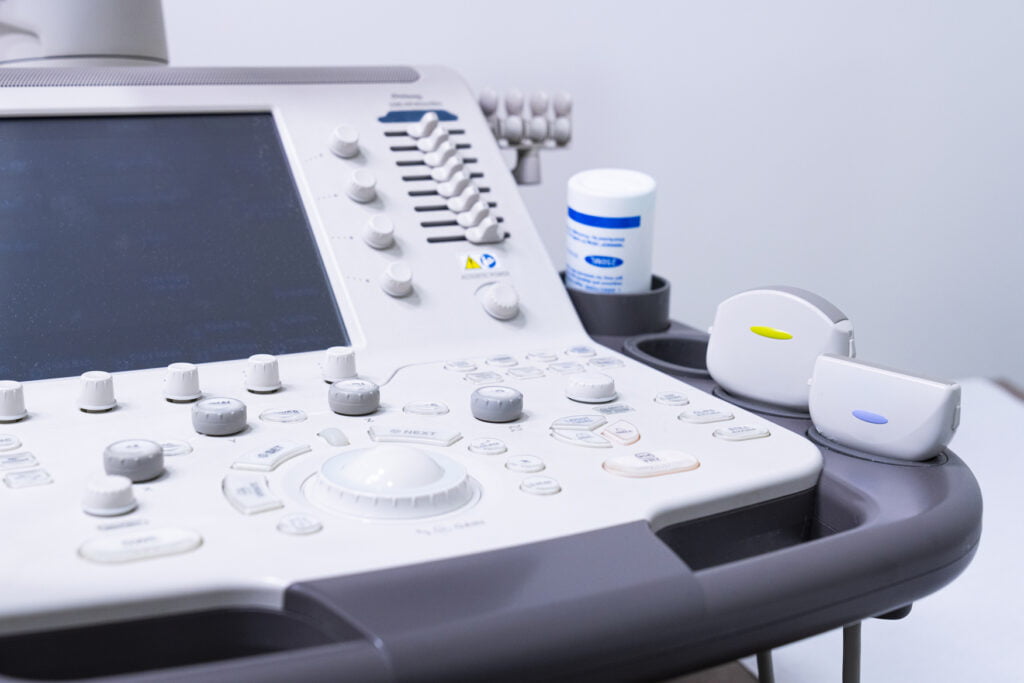At Klinik Casabrina, we offer comprehensive Transvaginal Scans (TVS) to support women’s health and provide precise diagnostic insights. The TVS is a highly effective imaging technique used to examine the female reproductive organs in detail. This procedure is essential for diagnosing and managing a range of gynaecological conditions, ensuring that you receive the most accurate and personalised care.
A Transvaginal Scan (TVS) is a type of pelvic ultrasound imaging performed using a specialised probe inserted into the vagina. This method provides a clear and detailed view of the uterus, ovaries, and other pelvic structures, allowing for better evaluation compared to traditional abdominal ultrasounds. TVS is particularly useful for assessing early pregnancy, detecting abnormalities, and guiding treatment decisions.
During a TVS scan, a small, lubricated probe is gently inserted into the vagina. The probe emits sound waves that bounce off internal structures, creating detailed images on a monitor. This close-up view allows for a detailed examination of the ovaries, uterus, and other pelvic organs. Transvaginal ultrasound scans are particularly useful for visualising the ovaries and identifying cysts or abnormalities.

A TVS scan allows for a closer look at the pelvic organs, helping to identify potential causes of unexplained pelvic pain.

In the first trimester, this scan can confirm the pregnancy, detect the fetal heartbeat, and assess the gestational age.

By providing a detailed image of the uterus and endometrial lining, the scan enables accurate diagnosis and appropriate management.

This scan evaluates the uterus for any abnormalities such as fibroids, polyps, or congenital structural issues that might affect fertility.
TVS provides high-resolution images that are essential for accurate diagnosis and effective management of these conditions, guiding treatment decisions and ongoing monitoring. If you suspect having one of these conditions, coming in for a checkup can be helpful.
TVS scans are particularly effective in visualizing ovarian cysts, which are fluid-filled sacs that can form on the ovaries. By providing detailed images, it can differentiate between different types of cysts—such as functional cysts, dermoid cysts, or endometriomas. It helps determine the size, location, and characteristics of the cyst, which is crucial for assessing whether further treatment or monitoring is necessary.
Fibroids, or leiomyomas, are benign tumours in the uterus. TVS scans offer a clear view of these growths, allowing for detailed assessment of their size, number, and location. This is essential for determining the best treatment approach, whether it’s medication, hormone therapy, or surgical intervention. TVS scans can also help monitor the fibroids over time to assess any changes in their size or symptoms.
PID is an infection of the female reproductive organs, often caused by sexually transmitted infections. TVS scans helps in evaluating the extent of inflammation and infection in the pelvis. It can reveal signs of fluid accumulation in the pelvic cavity or around the uterus and ovaries, which may indicate PID.
PCOS is characterised by multiple small cysts on the ovaries, often accompanied by irregular menstrual cycles and hormonal imbalances. TVS scans help in diagnosing PCOS by visualising the ovaries and identifying the characteristic “string of pearls” appearance of multiple small cysts. It also aids in assessing ovarian volume, which may be increased in women with PCOS.
Endometrial hyperplasia is a condition where the lining of the uterus becomes too thick. TVS measures the thickness of the endometrium, providing valuable information for diagnosing hyperplasia. By assessing endometrial thickness, TVS helps in distinguishing between normal variations and pathological thickening, which could be indicative of hormonal imbalances or a precursor to endometrial cancer.

During your TVS appointment, you will be asked to lie down on an examination table. A lubricated probe will be gently inserted into the vagina to obtain clear images of the pelvic organs. The procedure is generally quick and minimally uncomfortable, lasting about 15 to 30 minutes. You may experience slight pressure or discomfort, but it should not be painful.
After your TVS, you can resume normal activities immediately. Your doctor will discuss the results with you and recommend any necessary follow-up actions or treatments based on the findings. If you have any concerns or experience unusual symptoms after the scan, contact our clinic for further guidance.

Most patients experience only mild discomfort during a TVS scan. The probe is designed to be smooth and flexible, and any discomfort typically lasts only for the short duration of the scan. If you feel significant pain, you should inform the technician immediately.
Preparation for a TVS scan is minimal. You may be asked to empty your bladder before the procedure. It is advisable to follow any specific instructions provided by your doctor. such as avoiding certain medications or dietary restrictions.
A TVS scan typically takes about 10 to 20 minutes. The duration can vary depending on the complexity of the examination and the specific conditions being evaluated.
After a TVS scan, you can resume your normal activities immediately. There may be a small amount of vaginal discharge or spotting, but this usually resolves quickly. Your doctor will discuss the results with you and recommend any necessary follow-up or treatment.
TVS is a safe procedure with minimal risks. It does not involve radiation, and the risk of infection is very low due to the use of sterile equipment. If you have any concerns or underlying health conditions, discuss them with your doctor before the scan.
TVS scans are generally not used for routine pregnancy assessments, as abdominal ultrasounds are more common. However, they may be used in specific situations, such as early pregnancy evaluations or to investigate certain complications. Always consult your doctor for advice regarding imaging during pregnancy.

Scheduling an appointment for your TVS scan is easy. Contact our friendly staff via phone or email to book your consultation. We strive to accommodate your schedule and ensure timely care.
Klinik Casabrina is a women’s and children’s healthcare clinic in Seremban, Malaysia. We provide specialized services such as gynecology check-ups, antenatal and postnatal care, and more.
Copyright © 2023 CASABRINA MEDICAL SDN BHD 202201045614 (1491311-M). All Rights Reserved | HTML Sitemap | Privacy Policy | Created by Hypercharge.